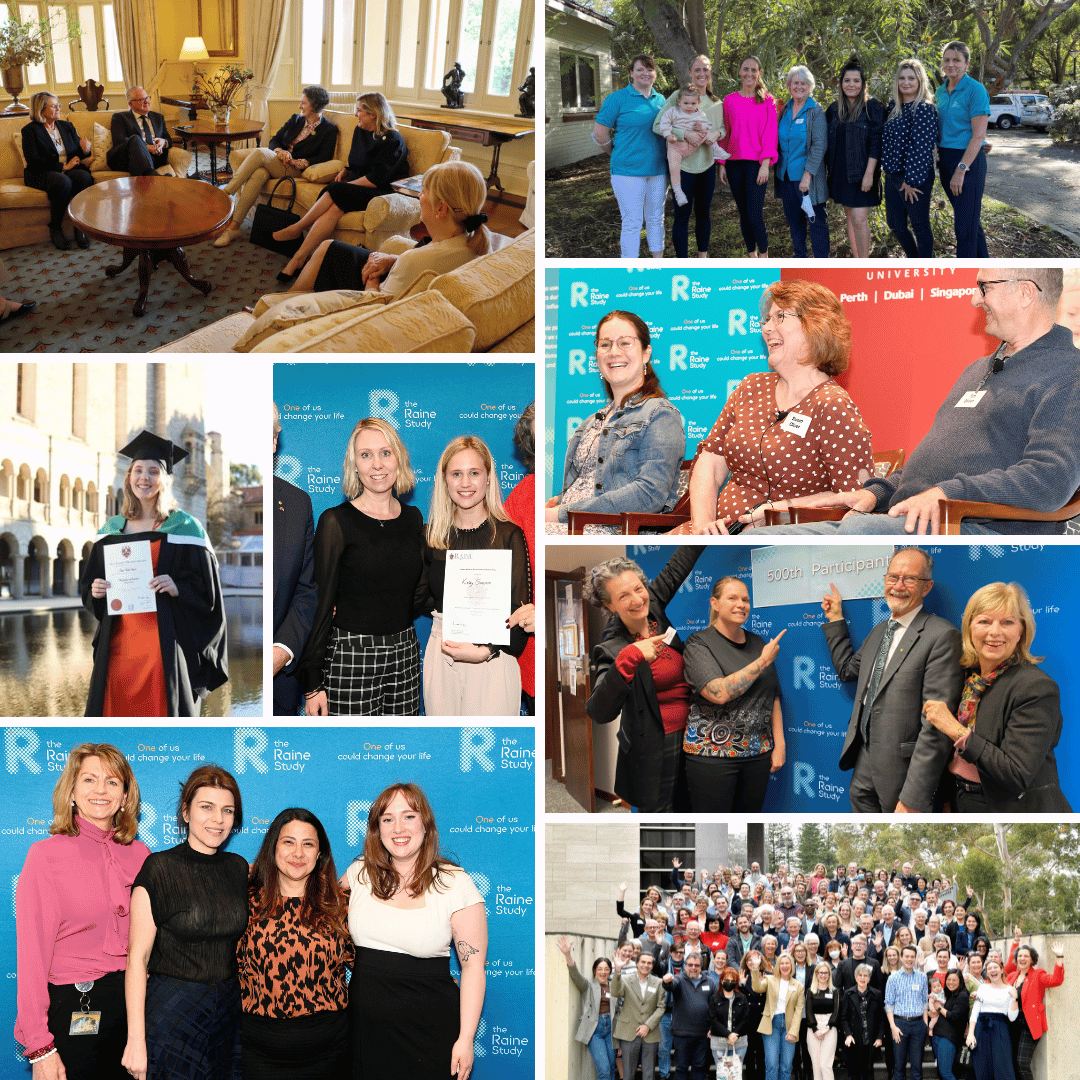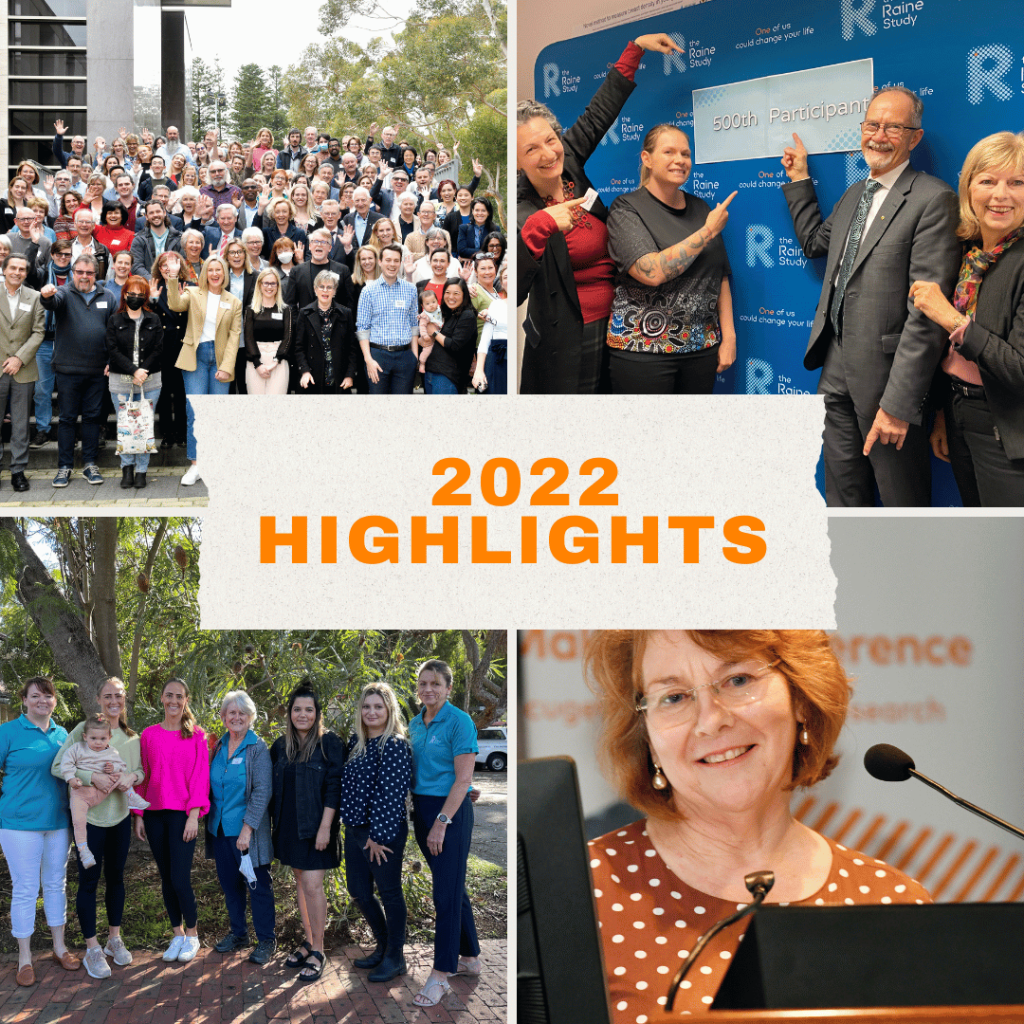January 2023: As 2023 gets underway, we thought we’d take the time to look back at the Raine Study’s key achievements in 2022. It was a busy and successful year for us all and one which saw us make significant progress in all areas of activity.
Partnerships
We continued to make headway in establishing and strengthening the Raine Study’s relationships and partnerships with key stakeholders, research and funding bodies in Western Australia.
- We were thrilled to start 2022 by celebrating the generosity of the Stan Perron Charitable Foundation in awarding landmark funding to help safeguard the future of the Raine Study.
- With funding from Lotterywest we made significant progress developing the strategic plan for a WA Cohort Data Portal in partnership with our fellow Western Australian cohort studies the Busselton Health Study and the ORIGINS Project.
- We hosted WA’s Chief Scientist Professor Peter Klinken at the Raine Study and were honoured to hear him acknowledge the value that the Raine Study has delivered to health and scientific discovery over the last three decades.
- Our Unincorporated Joint Venture board members took part in an extensive planning process which resulted in the publication of the Raine Study’s new 5-year strategy for 2023 and beyond.
- We farewelled outgoing WA Governor and Raine Study Patron the Honourable Kim Beazley, and were delighted when WA’s new Governor the Honourable Chris Dawson accepted the invitation to become our new Patron. In October, the Raine Study’s leadership team were invited to Government House to meet in-person with the Governor and Mrs Dawson, a very positive and productive meeting.
- The WA Minister for Medical Research, Volunteering, and Innovation and ICT Stephen Dawson accepted our invitation to officially open the Raine Study’s Symposium event in September (the reimagining of our previous Annual Scientific Meeting).
- At the Symposium, we spread the word about the wide range of research which is possible through the Raine Study’s partnership model. We celebrated partnerships with presentations from our oldest funding partner the Raine Medical Research Foundation as well as our newest (the Stan Perron Charitable Foundation).
- We hosted 8 interns through UWA’s Work Integrated Learning program, from across a range of disciplines, and look forward to welcoming more from UWA and other partners in 2023.
Participants
Participants are the heart of everything we do at the Raine Study – without their ongoing voluntary commitment to taking part in our data collection, serving on our operations and scientific committees, consulting, and providing input to specific research projects, there is no Raine Study.
- To start 2022, we analysed feedback from nearly 350 participants who had provided input about what health and wellbeing topics they thought should be included in the upcoming Generations follow-up. We returned to these findings on a number of occasions throughout the year.
- We welcomed many new faces from Perth and interstate to our Raine Study Community Advisory Committee (RSCAC) and farewelled some long-standing members. The RSCAC comprises representatives from our Gen1 and Gen2 participant groups who meet quarterly with the Raine Study’s leads and who help guide the future direction of the Raine Study through their involvement in the Raine Study’s UJV Board, Scientific Review Committee and Operations Management Committee.
- In May, we reached the incredible milestone of 500 participants taking part in our heart function study, the very last study of our 28-year follow-up. Originally started in early 2020, we were fortunate to welcome out of state participants back to take part in the follow-up once border protection measures were eased.
- We welcomed more than 75 participants of all ages (Gen1 parents, Gen2 original kids and their Gen3 babies) to the Raine Study Symposium in September, a new record for participant involvement in the event, and were privileged to hear their thoughts on the future direction of the Raine Study as well as have the opportunity to acknowledge the immensity of their contributions to our success.
- By October, planning for 2023’s Generations Follow-Up was well underway. This history-making follow-up will see us invite the entirety of our Gen1 and Gen2 participants to take part in the assessment and collect data from both generations simultaneously, something we haven’t been able to do since the very start of the Raine Study. We have conducted several focus groups with participants to get their thoughts and ideas for the direction of the follow-up and additional research projects, and have heard loud and clear that they would like to see the next generation of Raine Study offspring (the children of our Gen2s,aka Gen3) incorporated into the study in the near future.
Research
- We followed through on our commitment to reinvigorate the function of the Raine Study’s Special Interest Groups (research focus areas), the framework which enables our 350+ researchers to collaborate across their area of research. By the end of 2022 we had hosted a number of SIG workshops, welcomed two new researchers to leadership roles in two of our twelve SIGs, and were fortunate to retain the support of 23 researchers from around Australia who agreed to continue in their existing roles as champions of our SIGs.
- In September, our 2022 Symposium event continued to help us spread the word about the breadth and depth of opportunities the Raine Study can offer researchers at all stages of their careers, from students and early career researchers to emeritus professors and world-renown experts in their field of endeavour.
- We supported 43 new project applications, including 22 grant applications and 21 research proposals. Of the 22 grant proposals, 12 of these are leveraging the Generations Follow-up commencing in 2023. We also facilitated 59 data access requests, and 7 biosample requests.
Last but certainly not least Raine Study researchers continued to conduct life-changing, world-leading research based on the Raine Study’s unique data holding. A total of 45 papers using Raine Study data were published in academic journals around the world in the period January-December 2022, covering a range of topics from across the human lifespan as diverse as pain, vision, cardiometabolic health, neurological development and fertility. 20 of these involved authors with international affiliations which is testimony to the reach and impact of the Raine Study globally.


